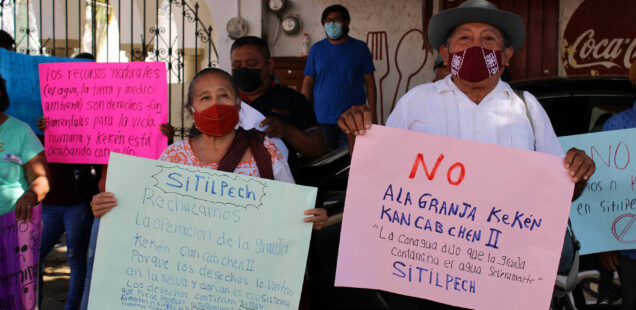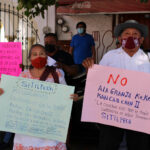
Kanan’s ambitious challenge in Yucatan, Mexico: how to deal with internal conflicts in uninformed and polarised communities?
Kanan Derechos Humanos (in short Kanan) is a non-governmental organisation based in the Yucatan Peninsula in Mexico. It is founded and run by young human rights defenders as a response to the vortex of threats to territory and communities on the peninsula. The organisation defends and promotes human rights through strategic litigation, communication for social change and strengthening the organisational processes of social actors. The central idea is to transform structures of inequality, in particular by accompanying processes linked to the rights of the Mayan people in the face of the imposition of pig farms, which are developed in a serious context of pollution and impunity.
The first complaint of human rights violations by pig farms on the peninsula dates back approximately 10 years, with the case of the Mayan community of Kinchil. Since then, and especially in the last three years, the number of communities that have filed complaints about the industry has increased. In that same time, Kanan has accompanied two communities, Chapab de las Flores and Sitilpech, but at least three more have requested support, which Kanan has not been able to accompany to date due to the high legal, technical, and human costs required to take on a single case. In addition, at least eight other Mayan communities in the region report being affected by the industry.
The patterns followed by the imposition of the farms are centred on the absence of prior consultation with the Mayan communities where they are located; the lack of permits for the loading and discharge of underground water; the absence of permits for changes in land use (so that they can deforest and build); the lack of monitoring processes for proper operation; and the lack of environmental impact assessments. It is important to underline that the historical needs of communities are regularly used to manipulate them into accepting farms. For example, many set up free medical clinics in communities lacking such services, pushing that, if the farm is removed, people would lose care.
The current state of advocacy is not straightforward. Since the beginning of 2023, in addition to the impunity with which the industry operates, there have been criminalisation actions, threats, arbitrary arrests and hate speech in the media against communities and organisations that, like Kanan, have taken a stand against this industry. The organisation is currently part of a protection mechanism for human rights defenders in Mexico, following various attacks and threats.
Since 2022, the Feyerabend Foundation has been working with Kanan to imagine and build forms of ‘development’ that support Mayan culture and offer alternatives to employment on the pig farms in the community of Chapab de las Flores. This is a major challenge, in the face of a State that acquiesces to everything that is justified as ‘development’, and an increasingly uninformed and polarised society. And the difficulties are also caused by conflicts of interest in the communities, particularly between ejidatarios and people who do not have land rights, and between families who have family members working on the farms and those who do not, and above all want the pollution to stop. These internal conflicts are the most powerful challenge that Kanan has to face and solve in a peaceful and positive way. A Mayan organisation working locally will soon collaborate more with Kanan precisely to build these solutions… but the issue is universal and experiences and advice that can be shared would be very much appreciated.










